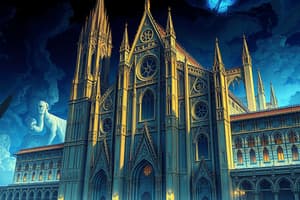Podcast
Questions and Answers
Leonardo da Vinci fue un artista del Renacimiento conocido por su enfoque en el realismo, la perspectiva y el humanismo.
Leonardo da Vinci fue un artista del Renacimiento conocido por su enfoque en el realismo, la perspectiva y el humanismo.
False (B)
La Capilla Sixtina es una de las obras más icónicas de la arquitectura renacentista.
La Capilla Sixtina es una de las obras más icónicas de la arquitectura renacentista.
False (B)
El Renacimiento se caracterizó por un interés en la cultura y arte de la antigua Roma y Egipto.
El Renacimiento se caracterizó por un interés en la cultura y arte de la antigua Roma y Egipto.
False (B)
La arquitectura renacentista se caracterizó por utilizar técnicas como la perspectiva lineal y el uso de columnas para crear la ilusión de profundidad y equilibrio.
La arquitectura renacentista se caracterizó por utilizar técnicas como la perspectiva lineal y el uso de columnas para crear la ilusión de profundidad y equilibrio.
Miguel Ángel fue un arquitecto renacentista conocido por diseñar la Cúpula de San Pedro en Roma.
Miguel Ángel fue un arquitecto renacentista conocido por diseñar la Cúpula de San Pedro en Roma.
El uso de luz y sombra para crear profundidad en las obras de arte se conoce como tenebrismo.
El uso de luz y sombra para crear profundidad en las obras de arte se conoce como tenebrismo.
La arquitectura renacentista se caracterizó por un enfoque en principios clásicos y el uso de nuevas técnicas innovadoras.
La arquitectura renacentista se caracterizó por un enfoque en principios clásicos y el uso de nuevas técnicas innovadoras.
Rafael fue un escultor renacentista conocido por sus obras arquitectónicas en el Vaticano.
Rafael fue un escultor renacentista conocido por sus obras arquitectónicas en el Vaticano.
El Renacimiento fue un período de renacimiento cultural y artístico que comenzó en Europa en el siglo XVIII.
El Renacimiento fue un período de renacimiento cultural y artístico que comenzó en Europa en el siglo XVIII.
La perspectiva lineal es una técnica utilizada en el Renacimiento para crear ilusiones ópticas en las obras de arte.
La perspectiva lineal es una técnica utilizada en el Renacimiento para crear ilusiones ópticas en las obras de arte.
Flashcards are hidden until you start studying
Study Notes
Renaissance Art and Architecture
The Renaissance was a period of cultural and artistic rebirth in Europe that began in the 14th century. It was characterized by an interest in the art and culture of the classical world, particularly ancient Greece and Rome, and the development of new techniques and styles in art and architecture.
Renaissance Art
Renaissance art is known for its focus on realism, perspective, and humanism. Artists of the time, such as Leonardo da Vinci, Michelangelo, and Raphael, sought to capture the human form in a more lifelike way, using techniques like chiaroscuro (the use of light and shadow to create depth) and linear perspective (the use of parallel lines to create the illusion of depth). This focus on realism and the human form led to the creation of some of the most iconic works of art in history, including the Mona Lisa and the Sistine Chapel ceiling.
Renaissance Architecture
Renaissance architecture was also characterized by a focus on classical principles and the use of new techniques. Architects of the time, such as Filippo Brunelleschi and Leon Battista Alberti, sought to create buildings that were both functional and aesthetically pleasing. They used techniques like linear perspective and the use of columns and pilasters to create the illusion of depth and balance. This focus on classical principles and new techniques led to the creation of some of the most iconic buildings of the time, including the dome of St. Peter's Basilica and the Palazzo Rucellai.
Influence of Renaissance on Art and Architecture
The Renaissance had a profound impact on the development of art and architecture in Europe and beyond. It laid the foundation for the development of modern art and architecture, with its focus on realism, perspective, and humanism. The principles of Renaissance art and architecture continue to influence the work of artists and architects today, and the era is still celebrated for its contributions to the cultural and artistic legacy of humanity.
Studying That Suits You
Use AI to generate personalized quizzes and flashcards to suit your learning preferences.




